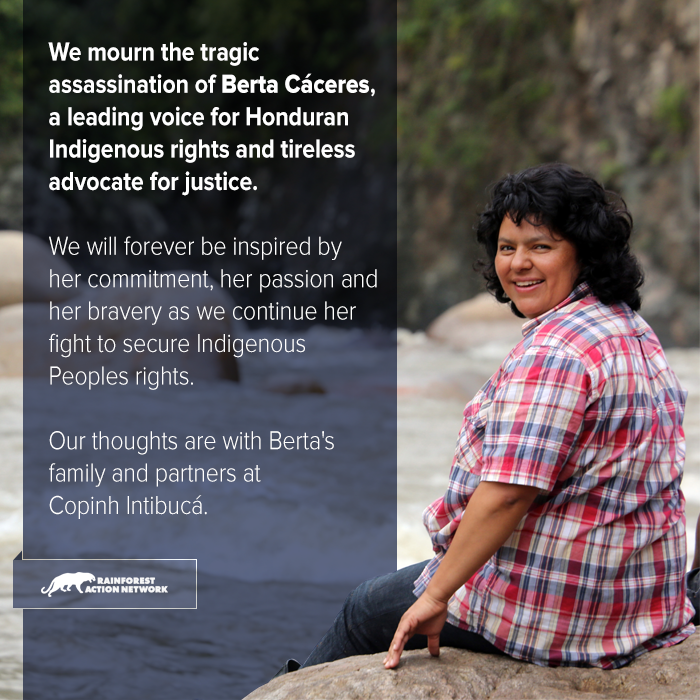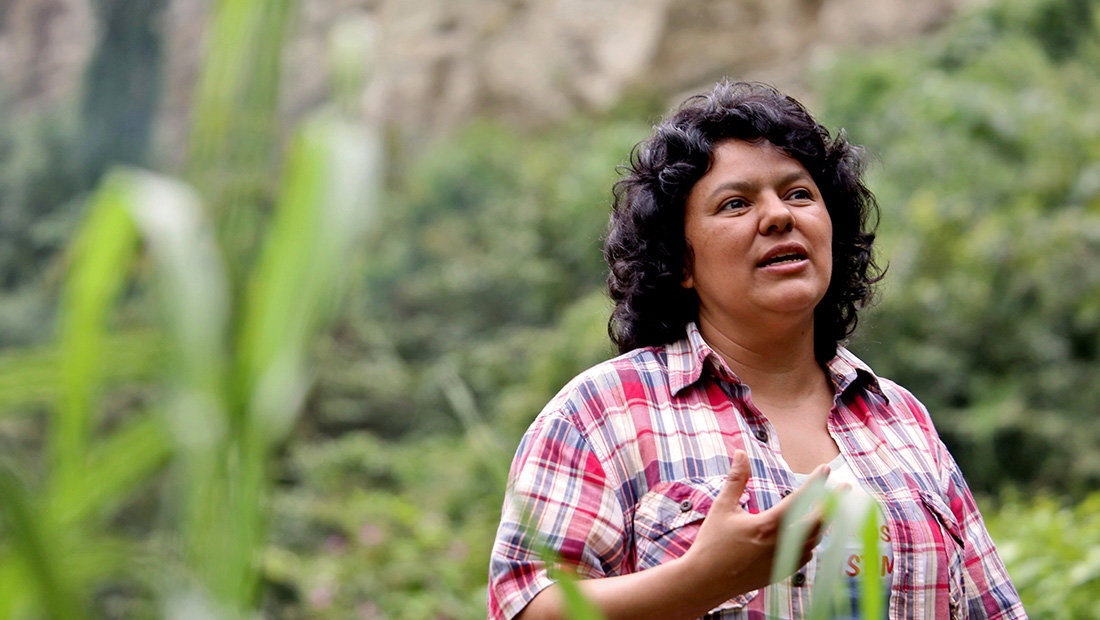Today, RAN and the environmental and social justice movements at large mourn the tragic assassination of Honduran Indigenous and environmental organizer Berta Cáceres. She was one of the leading organizers for Indigenous land rights in Honduras and a 2015 Goldman Environmental Prize winner.
 Berta Cáceres, a Lenca woman, grew up during the violence that swept through Central America in the 1980s. Cáceres grew up to become a student activist and in 1993, she cofounded the National Council of Popular and Indigenous Organizations of Honduras (COPINH) to address the growing threats posed to Lenca communities by illegal logging, fight for their territorial rights and improve their livelihoods. Berta had elevated her efforts to protect people and fight dams across Honduras in recent years, which led to threats against her life.
Berta Cáceres, a Lenca woman, grew up during the violence that swept through Central America in the 1980s. Cáceres grew up to become a student activist and in 1993, she cofounded the National Council of Popular and Indigenous Organizations of Honduras (COPINH) to address the growing threats posed to Lenca communities by illegal logging, fight for their territorial rights and improve their livelihoods. Berta had elevated her efforts to protect people and fight dams across Honduras in recent years, which led to threats against her life.
Berta Cáceres rallied the indigenous Lenca people of Honduras and waged a grassroots campaign against the Agua Zarca Dam, pressuring local company Desa along with a consortium of international dam builders including China’s Sinohydro, the World Bank’s private sector arm, the International Finance Corporation and other foreign partners, including the Dutch Development Bank, the Finnish Fund for Industrial Cooperation and German companies Siemens and Voith Hydro to abandon the project.
When asked about the risks she faced for standing up to powerful landowners, a US-funded police force, and a mercenary army of private security guards in the most murderous country in the world for environmental campaigners, Berta said she felt obliged to fight on and urged others to do the same.
“We must undertake the struggle in all parts of the world, wherever we may be, because we have no other spare or replacement planet. We have only this one, and we have to take action,” she said.
Berta’s work was highlighted in the 2014 report by Global Greengrants and the International Network of Women’s Funds, Climate Justice & Women’s Rights, as an example of the increasing violence against women activists. The report called on the international philanthropic community to analyze violence and address institutions that perpetuate it.
According to Global Witness, and as described in this Democracy Now! article about Berta’s assassination, Honduras is the deadliest country in the world for environmentalists. Between 2010 and 2014, 101 environmental campaigners were killed in the country.
The work of COPINH and many other front line indigenous organizations around the world to defend the basic human rights of people forced off their land and denied access to water and natural resources is violently threatened. The inability of governments to provide security makes it increasingly dangerous and difficult for communities to protect their rights and environments. The perpetrators of this violent crime must be held accountable. We call on the international community to support community organizations to ensure their safety as they work to protect community rights to lands, forests, water, and natural resources.
We honor Berta, and will continue to be inspired by her bravery and actions as we continue the fight to secure Indigenous Peoples rights.
You can read more about her work at http://www.goldmanprize.org/recipient/berta-caceres/
More information on this tragedy is at http://www.democracynow.org/2016/3/3/honduran_indigenous_leader_berta_caceres_assassinated
You can see the video of her 2015 Goldman Prize acceptance speech here:

